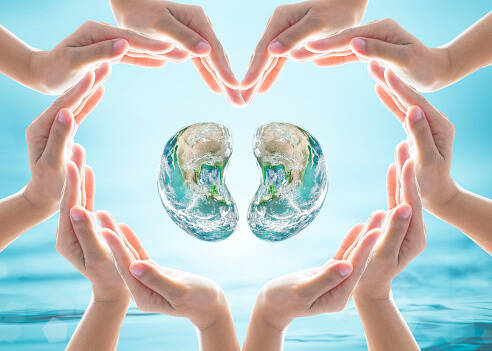- wikiskripta.eu - Filtration in the kidney
- solen.sk - Definition, evaluation and classification of chronic disease, prof. MUDr. Viera Spustová, DrSc., Department of Clinical and Experimental Pharmacotherapy, Slovak University of Health Sciences, Bratislava
- solen.sk - Adolescent nephrology, Katarína Furková, Miroslav Šašinka, Department of Paediatrics, SZU, Bratislava
Kidney care: how to regenerate and strengthen them?

Kidney disease often brings with it the risk of complications, which are as dangerous as the disease itself. But how can we avoid kidney disease? We should think about our kidneys all the time. They need to be looked after properly. They are very important for us and our health.
Article content
Can the kidneys be regenerated, cleansed and strengthened?
How should we behave so as not to impair their function and harm them?
The kidneys are a paired organ that serves to filter the blood and thus eliminate waste substances from our body. Therefore, they require proper care. If they are to serve us well, we must not neglect them.
Complications of kidney disease
Everyone would prefer to avoid kidney diseases. This is possible with proper care and by following certain guidelines. However, when they do occur, they also bring with them certain risks and complications.
Anemia
Otherwise known as anemia. It is actually a disorder of oxygen transfer to the tissues in the body. It happens because of a decrease in the concentration of hemoglobin. This is a blood dye that is part of red blood cells (erythrocytes). Oxygen binds to hemoglobin during respiration. More specifically to the iron molecules that combine with it. This is carried by the blood (specifically red blood cells) to other parts of our body.
Anemia has several causes:
- bulky or prolonged hidden bleeding
- a disorder of hematopoiesis
- deficiency of iron, vitamin B12, folic acid
- increased breakdown of red blood cells
- kidney disease
The kidneys produce the hormone erythropoietin. This stimulates the production of red blood cells in the bone marrow. When the kidneys are diseased, its production decreases. This decreases the production of red blood cells. This results in anaemia as part of kidney disease.
High levels of potassium in the blood
The body finds it difficult to cope with its excess and decrease. It is important for its healthy development. It is excreted from the body through the kidneys. It is very difficult to maintain its levels in a normal state.
Its elevated levels usually become apparent only when the kidneys fail.
It manifests itself in various ways such as:
- muscle weakness
- tingling in the peripheral parts of the body
- heart rhythm disturbances
High blood pressure
High blood pressure is otherwise known as hypertension. It is closely associated with kidney disease. In many cases, the disease itself also causes it. Otherwise, it is the same. In fact, high blood pressure, if left untreated, causes kidney disease.
It causes damage to the fine blood vessels in the kidneys where the blood is filtered. This reduces their proper function. The blood is not filtered sufficiently and unwanted waste products remain in the body.
Also read the article on how to eat when you have high blood pressure.
Dyslipidemia
It is a set of metabolic diseases in which the levels of fats and cholesterol in the blood plasma are disturbed. It is either an elevated level of them or a disorder of their breakdown from the blood.
They occur primarily as genetic disorders of fat metabolism, but may also be secondary to kidney disease, diabetes, obesity, hypothyroidism, alcoholism or unhealthy lifestyle.
You may be interested in this article on how to fat loss.
The so-called "bad" LDL cholesterol rises and the "good" HDL cholesterol drops. Symptoms usually only start to appear when the body is already severely damaged by the disease.
They are a high risk factor for cardiovascular disease.
Cardiovascular disease
Kidney diseases cause atherosclerosis, i.e. corrosion of the arteries. It is mainly high blood pressure that often causes them. Atherosclerosis is then a risk factor for cardiovascular disease.
This includes, for example, coronary heart disease, myocardial infarction and stroke.
Hyperuricaemia
This is an increased concentration of uric acid in the blood. It can be caused by several factors:
- increased energy intake
- increased consumption of red meat in particular
- high consumption of fish or seafood
- increased consumption of fructose and other sugars
- consumption of beer and spirits
- insufficient physical activity
Increased production and decreased excretion of the substance from the body are also causes.
Up to 70% of uric acid is excreted by the kidneys, the rest by the digestive tract.
It can cause the formation of urinary stones or a disease called gout. This is a disease in which uric acid crystals are deposited in the joints of the lower limbs. The crystals, being heavy, sink into the blood vessels, particularly in the toes. There they cause considerable pain.
Read also the article on kidney disease.
Common infections
In kidney diseases, the immune system is often weakened. Therefore, the affected person often suffers from infectious diseases or finds it more difficult to heal.
Bone disease
The kidneys regulate the level of minerals in the blood. These include calcium and phosphorus. In kidney disease, calcium from food is not absorbed sufficiently. This causes the bones to thin and reduces their strength.
How to care for your kidneys?
What care should be given to your kidneys? It is better to be healthy than sick. Nothing should be underestimated or belittled. One must not be indifferent to oneself.
So what should be done to keep the kidneys healthy or to heal them faster?
Stop smoking
It is not enough to want to and to try several times. It is necessary to really stop and to stop now. Moreover, smoking causes other diseases in the body. It contributes in no small measure to the development of cardiovascular disease.
Avoiding alcohol
Alcohol, as a socially tolerated drug, is responsible for many diseases and problems. And it is not only physical health that is affected. It is mainly in the form of beer and spirits that is harmful to the kidneys. Red wine, consumed in moderation, helps health in certain circumstances. However, in the case of kidney disease, it is better to avoid alcohol altogether.
Maintain a healthy lifestyle
Take care of your body. Keep moving and do regular sports if possible.
Read the article on how to create your own training plan.
Reduce your body weight
If necessary and you are overweight, adjust your lifestyle and reduce your weight. Obesity can be responsible for many diseases and kidney disease is one of the more serious ones.
In our article you will read how to lose fat.
Eat right
It is very important what we supply to our body. The diet is what reflects on our health. It must be balanced and contain all the ingredients in the right proportion.
The table below shows the recommended daily intake of some food components
| Food ingredient | Daily energy intake |
| Saturated fatty acids | <7 % |
| polyunsaturated fatty acids | > 10 % |
| monounsaturated fatty acids | > 20 % |
| Protein | about 15 % |
| Fats | maximum 30 % |
| carbohydrates | maximum 60 % |
| cholesterol | <300 mg per day |
| fibre | 25 to 35 g per day |
A balance should be maintained between energy intake and energy expenditure, so that intake does not exceed output and weight gain does not occur.
In our article you can read how to eat for weight loss.
Reduce your consumption of red meat in particular
Red meat and animal proteins increase the production of uric acid in the blood. This then causes health complications.
Interesting article on the Mediterranean diet.
Follow a drinking regime
For the kidneys, water is very important. Dehydration should be avoided. This causes kidney failure, which is then unable to filter the blood. Thus, waste substances remain in the body and cause health complications.
Medication should only be taken when necessary...
Medicines help, but they are also harmful, especially if they are taken when they are not necessary. Painkillers, so-called analgesics, are especially dangerous for the kidneys. Your kidneys will not thank you for their excessive and unnecessary use.
Finish your antibiotics
Antibiotics are not vitamins. However, the main thing to remember is that they are not suitable for every illness. They only react to bacterial diseases. Thus, viruses, which include the flu, do not react to them. Mindless use of antibiotics for every cold can only reduce the body's natural immunity.
As a rule, antibiotics start to work after three days of use. When one has already taken them, it is necessary to finish the whole package.
Along with them it is good to take probiotics. Because antibiotics also kill the good bacteria in the intestinal microflora.
Take a preventive examination
One should visit his/her district doctor for preventive check-ups. Taking blood for biochemical tests and taking blood pressure should be a matter of course. One should look into finding out the level of fats and uric acid in the blood.
Interesting resources










